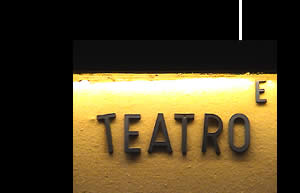|
Italian Theatre
Italian theatre stems from very ancient roots,
originating as far back as in ancient Latin and Greek times.
From time immemorial travelling players moved from one town
to the next and still today Italian theatre is based on the
idea of tours with no fixed theatre company in any one town.
Italy’s last great writer of drama was
Goldoni, with the progression from the masks of the
“Commedia dell’Arte” to the personified character.
Later in the second half of the XIXth cent., bourgois drama
became more and more prominent. Themes were mainly the family,
adultery (the husband-wife-lover triangle was a recurring
theme), social relations and failure of communications. But
it was Pirandello (1867-1936) who marked a very great
breakthrough for Italian theatre by introducing to the absurd
roles imposed by bourgeois society. This writer removed the
mask behind which every one of us defends his own convictions
to conceal his real self, and unveiled the naked truth, a
concept reflected in the general title of his entire theatrical
production, Maschere Nude (Naked Masks). Pirandello
also introduced a technical innovation, the “theatre
within the theatre”, which revolutionised traditional
forms of drama.
After 1861 most citizens of Unified Italy still
spoke in dialect and very few people were versed in proper
Italian; this led to the rise of dialect theatre across the
country. But dialect theatre flourished above all in Naples
thanks to the De Filippo brothers. In scripts written
by Eduardo (1900-1984), poor and lower middle class
characters act out everyday situations filled with melancholy.
This theatre’s success is bound up with the expertise
of this writer-actor in giving voice to the lower middle class
aspirations of his audiences who were emancipated, amid contradictions,
by way of characters often on the edge of society, who embarked
on improbable feats of social climbing. Eduardo’s theatre
echoes the real-life experiences of his audiences sitting
in the stalls, to whom he conveys unreserved solidarity.
Another significant name in the history of Italian
theatre is Giorgio Strehler who with Luchino Visconti
was founder of modern stage direction in Italy.
In the Fifties other interesting theatre directors
made their mark such as Luigi Squarzina, Mario Missiroli,
Giancarlo Cobelli and Aldo Trionfo; from the Seventies and
Eighties important names include Luca Ronconi and Massimo
Castri.
Today the Neapolitan tradition is still very
much alive thanks to Eduardo’s son, Luca De Filippo,
while Dario Fo, winner of the Nobel prize for literature,
is still a key figure in Italian theatre.
home
|











